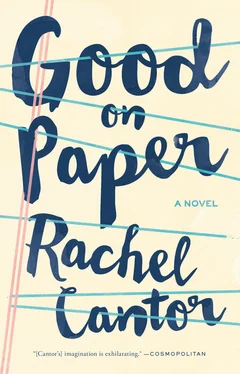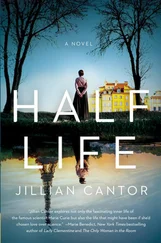You can’t, can you? he asked.
Not really.
But maybe you can tell me what you think? Broad impressions?
I, uh, haven’t read it yet.
Benny raised his shaggy eyebrows.
I was on my way to Joe’s, I said. I was going to read it there.
And somehow you ended up here?
To buy presents, I said. For Andi, and Ahmad.
Presents?
Books.
I guessed that. You have Romei’s first work in I don’t know how many years and you’re buying presents?
Something like that.
Hmm, Benny said, grinning.
What’s so funny?
What are you getting them?
I was hoping you’d suggest something.
I have a new Selected Poems by Pessoa that Ahmad would like and, uh, three dozen Nancy Drews to pick from for Andi. Ahmad’s been buying them in alphabetical order, so if you start with the last book you should be safe …
The last book being?
The Witch Tree Symbol …
You don’t know that!
I do, he said.
I laughed.
But what a cad I am! he said, rising. Would you like some ginger beer?
Sure, sweetie, that would be nice.
Benny raised his eyebrows again. Sweetie? he seemed to ask. I gave him a look that said, Term of endearment, goofball . And blushed, damn my susceptible cheeks.
•
While Benny got the ginger beer, I got the books, and congratulated myself on a win-win excuse. Andi and Ahmad deserved to share in my good fortune. I threw in a Pessoa bio and The Wild Cat Crime for good measure.
Benny returned with bottles and bendable straws, Marla following.
You can’t tell me about the work, he said, but you can tell me how you’ll go about it, right? I’ve translated a few poems here and there, but I can’t say I have a method. I’ll bet you do.
Marla had jumped onto Benny’s lap and was now batting his beard lazily with her paw.
You want to know my method? he said.
Is that weird?
I laughed.
I use a Buber-Rosenzweig leitwort approach, I said. Not as fancy as it sounds. When Buber and Rosenzweig translated the Bible into German, they always translated the same word the same way. They didn’t look for “pleasant-sounding” variations; they didn’t translate “according to context.” “White” didn’t become “cream” so it could rhyme with …
Bream.
Exactly. Words echoed the way words are supposed to, like leitmotifs in music.
Benny was smiling.
What? I asked.
I know Buber, he said. I know Rosenzweig.
Sorry, I said, blushing again. Of course you do.
Marla by now was curled into herself and sleeping, a purring ouroboros.
You used this approach for Dante? he asked.
I caught flak for it in grad school, I said. You get stuck with certain words, which means sometimes you sacrifice sound or rhythm. Everyone’s all into Dante’s “sweet style,” so they had a problem with this. I thought it was worth it: words repeat in Vita Nuova , and when they do, they become more meaningful. Take the word “pilgrim,” like you mentioned last night— peregrino. Vita Nuova is full of pilgrims, right?
The romei , among others.
Exactly. There’s even a pilgrimming spirit! These images concentrate toward the end of the book, leading Dante to his final vision, which points him toward the path he must take — as a sort of pilgrim himself. But remember that earlier, when Love offers dubious advice about which path Dante should take, he does so in the guise of a pilgrim, forcing us, if we remember that image, to compare encounters and decide which path is best. We can’t do this if the earlier pilgrim is translated as “traveler,” as often he is.
Benny was smiling again.
I haven’t seen you so intent since that first time I heard you read!
At Trixie’s! I said.
The reading had been part of a short-lived series at a macrobiotic café, organized by my former writers’ group (The Purple People Eaters). It had to be Trixie’s because my first reading had also been my last. Before I went to India, before Andi.
A banner day, Benny said, presumably because that’s when we met. But it’s getting late, he said, standing. Fascinating as this is, I gotta go.
Or you’ll turn into a pumpkin? I thought, then remembered: there was only one pumpkin in this room.
Maybe you’ll come in again tomorrow, and the day after? he said, leaning down to kiss my cheek. My heart lurched just a tiny bit, silly thing. I looked past Benny at Marie who, fully awake now, gave me the finger.
Shall I tell you what I did behind my friend’s back?
I shan’t.

I sat down in Slice of Park to look over Romei’s pages for the first time. Prose and poems in more or less expected proportion. The pages clean, double-spaced, no typos or handwritten insertions. A subheading on page one: “The Call.”
Odd.
“The Call”? As in my essay, which Romei had read — he’d said so. Was he borrowing my idea? No one else I knew of had compared Vita Nuova to the hero’s journey, or maybe it was coincidence.
The first pages of Vita Nuova recount Dante’s call to love. His first vision of the eight-year-old Beatrice (in delicate crimson) causes his spirits — vital, sensual, natural — to exclaim (again in Latin): Ecce deus fortior me, qui veniens dominabitur mihi! “Here is a god, more powerful than I, who comes to rule me.” This god being Love, the not-always-reliable mentor who accompanies Dante through much of his journey.
Nine years later, Dante again encounters Beatrice. This time she greets him, which so overwhelms him, he has to retire to his room. Thinking of her, he falls asleep and has a vision: Love — a terrifying figure! — force-feeds Dante’s burning heart to a semi-comatose Beatrice, then carries her off to heaven. This time Dante’s call to love prompts him to write; he crosses that threshold by writing a sonnet (about Beatrice eating his burning heart) and sending it (“anonymously”) to poets of note. His response, in other words, is to become A Poet. What would be Romei’s “call,” I wondered, and what his response?
I went to Joe’s to find out.
16. A MOST SPIRITUAL COMMUNION

Joe made me a double, offered it to me with a wink. I stepped over his infant twins, who were crawling among the regulars like puppies, begging sweets. I smiled at the Old Jewish Couple, the corpulent actor, removed the Reserved card from a front window table, and nodded at the boutique lady, who looked smashing in her painted silk blouse, and the Barnard student, absorbed in her Gramsci.
I looked at Romei’s pages more carefully. They seemed to correspond with the first four “chapters” of Vita Nuova , chapters that comprise a mere six pages in my Italian edition. In these opening pages, Dante promises to transcribe events from his “book of memory”; Romei instead says he’ll rely on the “book of the mirror.” I guess this meant he’d look at his past subjectively . Not a radical or even an interesting claim.
But he also said he’d “write of her that which has never been written of any other.” Now that was interesting, for it is with these words that Dante ends his tale. By making this promise up front, Romei says: Sorry, Dante, the superior poetic has arrived and it is mine. In saying so, he challenges Dante to a duel, naming me, of all people, as his second — to watch his back, tend his wounds, and bear witness to his victory.
Читать дальше













